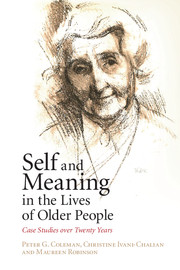28 results
The development of aboriginal brain injury coordinator positions: a culturally secure rehabilitation service initiative as part of a clinical trial
- Part of
-
- Journal:
- Primary Health Care Research & Development / Volume 22 / 2021
- Published online by Cambridge University Press:
- 29 September 2021, e49
-
- Article
-
- You have access
- Open access
- HTML
- Export citation
Attitudes toward advance care planning among persons with dementia and their caregivers
-
- Journal:
- International Psychogeriatrics / Volume 32 / Issue 5 / May 2020
- Published online by Cambridge University Press:
- 16 July 2019, pp. 585-599
-
- Article
- Export citation
3 - Investigating older people's lives at the end of the twentieth century
-
- Book:
- Self and Meaning in the Lives of Older People
- Published online:
- 05 May 2015
- Print publication:
- 27 April 2015, pp 16-28
-
- Chapter
- Export citation
7 - Women becoming frailer
-
- Book:
- Self and Meaning in the Lives of Older People
- Published online:
- 05 May 2015
- Print publication:
- 27 April 2015, pp 128-169
-
- Chapter
- Export citation
Appendix: Participant characteristics
-
- Book:
- Self and Meaning in the Lives of Older People
- Published online:
- 05 May 2015
- Print publication:
- 27 April 2015, pp 237-238
-
- Chapter
- Export citation
Contents
-
- Book:
- Self and Meaning in the Lives of Older People
- Published online:
- 05 May 2015
- Print publication:
- 27 April 2015, pp vii-viii
-
- Chapter
- Export citation
Frontmatter
-
- Book:
- Self and Meaning in the Lives of Older People
- Published online:
- 05 May 2015
- Print publication:
- 27 April 2015, pp i-iv
-
- Chapter
- Export citation
2 - From self-esteem to meaning – studying psychological well-being in later life
-
- Book:
- Self and Meaning in the Lives of Older People
- Published online:
- 05 May 2015
- Print publication:
- 27 April 2015, pp 6-15
-
- Chapter
- Export citation
References
-
- Book:
- Self and Meaning in the Lives of Older People
- Published online:
- 05 May 2015
- Print publication:
- 27 April 2015, pp 239-242
-
- Chapter
- Export citation
8 - Men becoming frailer
-
- Book:
- Self and Meaning in the Lives of Older People
- Published online:
- 05 May 2015
- Print publication:
- 27 April 2015, pp 170-194
-
- Chapter
- Export citation
5 - Adaptation to loss of spouse
-
- Book:
- Self and Meaning in the Lives of Older People
- Published online:
- 05 May 2015
- Print publication:
- 27 April 2015, pp 61-99
-
- Chapter
- Export citation
4 - Ageing together
-
- Book:
- Self and Meaning in the Lives of Older People
- Published online:
- 05 May 2015
- Print publication:
- 27 April 2015, pp 29-60
-
- Chapter
- Export citation
10 - The future of later life: personal and policy perspectives on ageing and meaning
-
- Book:
- Self and Meaning in the Lives of Older People
- Published online:
- 05 May 2015
- Print publication:
- 27 April 2015, pp 220-236
-
- Chapter
- Export citation
Preface and acknowledgements
-
- Book:
- Self and Meaning in the Lives of Older People
- Published online:
- 05 May 2015
- Print publication:
- 27 April 2015, pp ix-x
-
- Chapter
- Export citation
9 - Towards one hundred years
-
- Book:
- Self and Meaning in the Lives of Older People
- Published online:
- 05 May 2015
- Print publication:
- 27 April 2015, pp 195-219
-
- Chapter
- Export citation
6 - Ageing alone
-
- Book:
- Self and Meaning in the Lives of Older People
- Published online:
- 05 May 2015
- Print publication:
- 27 April 2015, pp 100-127
-
- Chapter
- Export citation

Self and Meaning in the Lives of Older People
- Case Studies over Twenty Years
-
- Published online:
- 05 May 2015
- Print publication:
- 27 April 2015
Index
-
- Book:
- Self and Meaning in the Lives of Older People
- Published online:
- 05 May 2015
- Print publication:
- 27 April 2015, pp 243-249
-
- Chapter
- Export citation
Dedication
-
- Book:
- Self and Meaning in the Lives of Older People
- Published online:
- 05 May 2015
- Print publication:
- 27 April 2015, pp v-vi
-
- Chapter
- Export citation
1 - Living a long life – why survive?
-
- Book:
- Self and Meaning in the Lives of Older People
- Published online:
- 05 May 2015
- Print publication:
- 27 April 2015, pp 1-5
-
- Chapter
- Export citation



